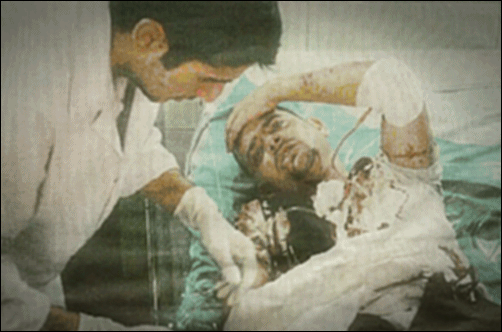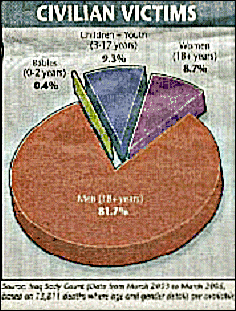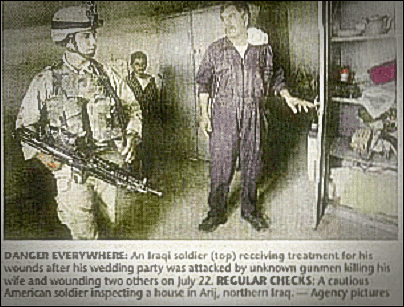Reaping what they sow
Dato' Dzulkifli Abd Razak
Article
New Sunday Times - 08/07/2005
Leaders who commit troops to wars have failed to weigh the human costs. This lack of leadership is worrying.
YESTERDAY a mammoth peace rally was held in Kuala Lumpur. It marked another tragic consequence of war, commemorating the 60th anniversary of the tragic twin-city bombing, beginning with Hiroshima on Aug 6 and Nagasaki three days later.
Hundreds of thousands of lives were wasted and the death toll is still climbing even today, caused by atomic radiation.
|
|
|
|
The twin event had so significant an impact that it cannot be easily overshadowed by the 60th anniversary of D-Day two months earlier on June 6, which celebrated the beginning of the end of Nazi tyranny in Europe.
This is because the atom bombs, the first in human history have affirmed that war can never be a "winning" pride even for the victors.
Today is yet another tragic anniversary that also could be related to war. Exactly a month ago, the subway and a bus in London, were attacked, leaving at least 50 dead and about 700 wounded.
Although, on the surface, it looked as though the attacks were unprovoked and isolated, a respected British research institution gave a different insight (NST, July 19).
"There is no doubt that the situation over Iraq has imposed particular difficulties for the UK, and the wider coalition against terrorism," said the Royal Institute of International Affairs (RHA).
Known as the Chatham House, this independent think tank which promotes the rigorous study of international issues, made the observation in a published report (http://www.chathamhouse.org.uk/pdf/research/niis/BPsecurity.pdf).
It implied that the war in Iraq made British vulnerable to attacks like those of July 7.
If so, it adds to the list of evidence that war is not a worthwhile strategy particularly when it is unilaterally executed, based on lies and faulty intelligence.
That Britain has become vulnerable was evident much sooner than expected when a second wave of attacks was launched two weeks after 7/7, accompanied by a fatal shooting of a man mistaken for a terrorist at a London subway.
The attacks were said to bear similarities to the 7/7 incidents.
More interestingly, the RHA report titled Riding Pillion For Tackling Terrorism Is High-risk Policy seems to express just that.
It noted: "A key problem with regard to implementing (the strategy against terrorism) is that the UK Government has been conducting counter-terrorism policy shoulder-to-shoulder with the US, not in the sense of being an equal decision-maker, but rather as pillion passenger, compelled to leave the steering to the ally in the driving seat."
This is the same ally which ignored international opinion in its rush to invade Iraq on grounds which later turned out not to be true.
Short of a day this week is the two-week anniversary of the carnage at the Red Sea Resort in Egypt.
Eighty-eight people, mostly foreigners, died and scores others were injured in car bomb attacks involving two hotels and a bazaar in the resort area of Sharm el-Sheik (NST, July 24).
These tragic anniversaries are by no means exhaustive. As we recall them with a heavy heart and extreme sadness, our sympathies must also go out to the many thousands of innocent Iraqis who were killed.
So, too, the members of the forces sent in by their respective Governments who have experienced similar carnage and anarchy.
In fact, as the 7/7 violence erupted in London, many more violent incidents erupted almost simultaneously in various places in Iraq, especially around Baghdad, according to numerous media reports (www.alertnet.org/thenews/newsdesk/KHA743681.htm).
The death toll is many, many times greater and, like the rest, are war-induced but with a difference — in the war-ravaged country, violence is almost a daily occurrence, some of them far more brutal and deadlier.
Ironically, Iraq looks like the new base for the insurgents.
Indeed, based on a survey by the Iraq Body Count (IBC), a US-British non-governmental organisation, nearly 26,000 civilians, police and army recruits have been killed by occupying forces, insurgents and criminal gangs since the "war" began in March 2003 (www.iraqbodycount.net/darabase).
Almost half of the deaths occurred in Baghdad, where a fifth of Iraq’s 25 million people live.
The second highest death toll was in Falluja, where one in every 137 of the town’s population has died violently.
Overall, more than 35 per cent were killed by US-led forces, according to the survey (http://news.bbc.co.uk/2/hi/mid-dle_east/4696875.stm).
Last October, Britain’s Lancet medical journal recorded four-fold (nearly 100,000) war-related deaths within 18 months of the invasion.
All these give even more convincing insights into the consequences of wars.
In other words, as IBC critically observed: "Leaders who commit troops to wars of intervention have diminishingly few excuses for failing to seriously weigh the human costs".
This lack of leadership is precisely the worrying trend of late.
Today, there are too many pillion riders among world leaders. But some are still saying that they are on course.
Consequently, human costs continue to be ignored, supplanted by misplaced pride, arrogance and egoistic instinct.
Incitement such as calls to "bring them on" were callous. This added fuel to an already inflamed situation.
Perhaps, it is such rhetoric that provided the "motivation" for the cycle of violence we see today.
After all, war is the best vehicle yet to perpetuate this kind of hatred and senseless killing.
Invariably, it leaves the world divided more than ever, plagued by lingering mistrust and suspicions, fuelled by raw animosities, leading to even more violence.
The only way to break this fatal vicious cycle is to cease riding pillion and be brave enough the take control of the steering and head for the path of reconciliation.
Meanwhile, many more innocent victims will die. The question is: When will all this stop?



